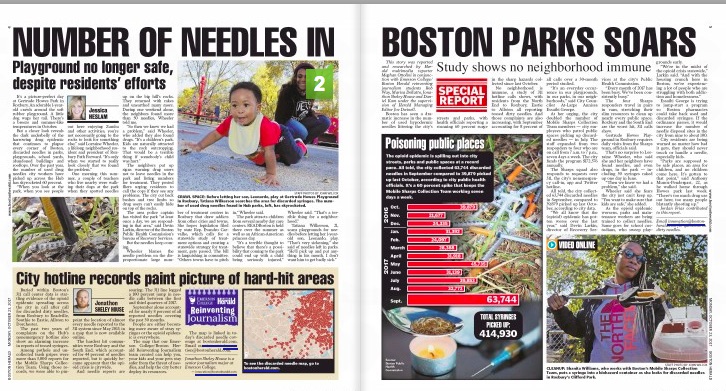Students Team Up with Boston Herald to “Reinvent Journalism”
It began as a discussion about bear sightings in New Hampshire.
Joe Dwinell had been showing his Reinventing Journalism class different ways to present data, including a map that pinpointed all the Granite State backyards that had ursine visitors.
Earlier in the class, a student had brought up a statistic she had recently seen: The number of discarded hypodermic needles collected from Boston streets and parks by city workers—a bellwether of the opioid crisis—had risen 60 percent in the last year. Another student had an idea for a project: instead of bears, why not map needles?
“We took that and ran with it to find data sets to [locate] needles exposed in Boston and tried to map it out,” said Jonathon Sheley House ’18.
Within a couple of weeks, a team of four student journalists — House, Rob Way '18, Marisa Dellatto '17, and Daniel Kam '18 — had gathered and mapped data from the city, tracked down concerned neighbors on social media, reported the story, and put together a multimedia package that ran online and off the front page of the Monday, October 23, Boston Herald. The students put together a story, interactive map, charts, a piece on Herald Radio, and a companion piece by columnist Jessica Heslam.
“This class is all about innovation and trying to tell a story in multiple platforms; that’s what I preach,” said Dwinell, managing editor of the Boston Herald and an affiliated faculty member at Emerson. “Trying to grab readers where they’re going….We can’t dictate how people read our stories; we have to give them options.”

In 2016, overall U.S. newspaper circulation (print and digital) fell by 8 percent from the previous year, according to the Pew Research Center, with the biggest drop coming from print. Revenue from digital advertising is on the rise, but not enough to offset precipitous drops in print advertising and circulation.
But there is good news: The American Press Institute reports that Millennials care about and are reading journalism, just in different ways than old models allow for.
Over the past several years, the Herald, Boston’s scrappy tabloid, has been experimenting with different modes of storytelling, like Boston Herald Radio, a news station that won the paper the 2015 Associated Press Media Editors Innovator of the Year Award. Dwinell, who started out in journalism three decades ago working off a mainframe computer, launched a searchable public records database on the Herald website, where readers can search for city employee payrolls, charitable contributions, and more.
While the front-page exposés are nice, Dwinell’s class is all about the long game.
His syllabus includes books like Dear Theo: The Autobiography of Vincent Van Gogh and Clayton Christensen’s The Innovator’s Dilemma, to get his students thinking differently, and then thinking about the repercussions of that.
“With any innovation, you hit a wall,” Dwinell said. “How do you climb over the wall? You think harder, you think smarter, you try different approaches. Everybody’s voice matters [in the class].”
A big part of the class, which is held at the Herald's Seaport offices, is the weekly columns students write for the Herald with ideas for disrupting the news business.
Way wrote about how newsrooms should produce news shows for streaming services like Netflix and Hulu. Joe Jacobs ‘18 said mainstream news organizations should cover the growing phenomenon of esports in their sports pages and newscasts. Dellatto, a second-semester senior, wants magazines to embed QR codes in their pages so that readers can get a multimedia experience on their phones in addition to the glossy print stories.
Dellatto said Reinventing Journalism is her favorite class this semester, due to the mix of old-school reporting, fresh and innovative thinking, intellectual discussions—and Dwinell himself, whom she calls an “absolute firecracker of energy.”
Despite the grim figures, Dellatto said she doesn’t think there’s a better time to get into journalism.
“Right now, it’s anyone’s game,” she said. “Whoever comes up with the next mode of making money and getting stories out in the most creative fashion, they’re going to be the industry leader.
“I like getting into [journalism] knowing I don’t know what my job will look like,” she added. “I know it’s going to be a career of coming up with new ideas and brainstorming.”
Categories